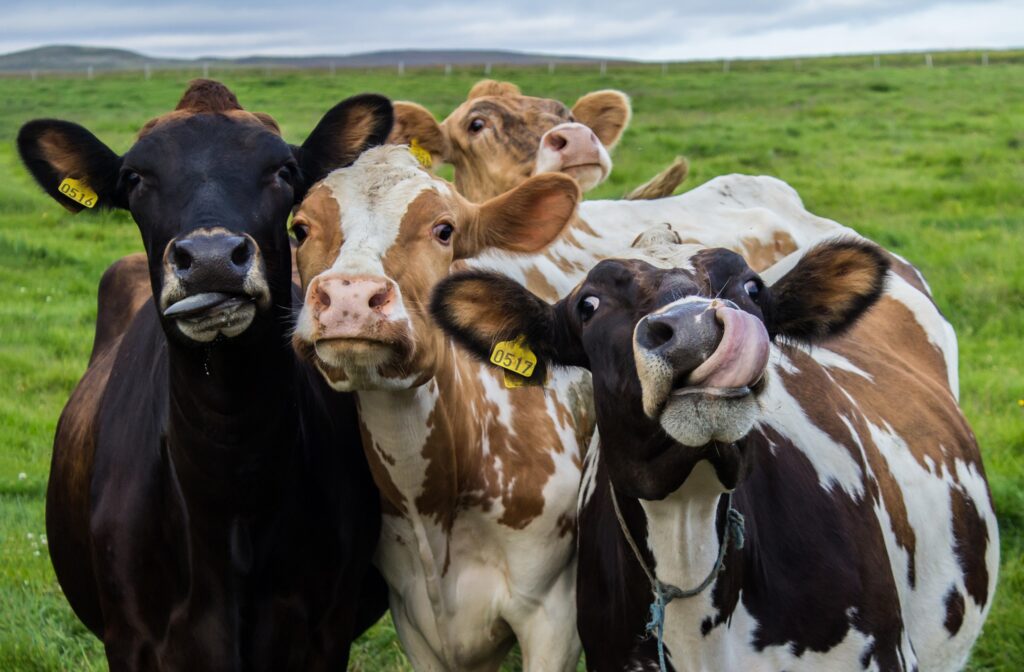Having written a few articles now with the “cows to corporate” theme, I’ve attempted to pass along some lessons I’ve learned along the way as both an HR leader and third-generation dairy farmer. In drawing some comparisons between life as a farmer and life in the workplace, I’ve been careful not to compare a herd of cows to human beings for so many valid and important reasons, not the least of which being the obvious truth that people are not cows and cows are not people.
However!
However, I do believe we can all be reminded occasionally that it is truly a wonderful thing to brighten the day of those around you, especially in these trying times. Whether you’re surrounded by people or surrounded by cows, a shameless act of egregious kindness can go a long way. Not only can it make someone’s day, it can also motivate us to be our best selves. The trick is in how you do it.
Motivating Cows
When I was on the farm, we fed our cows three different kinds of food. They’d eat hay, which is a special kind of dried grass, and although they ate a lot of it, it was not very fancy. They’d also eat corn silage, which was a fermented fodder made of chopped up corn stalks. Again, as appetizing as that sounds, not very exciting. On our farm, hay and corn silage made up the majority of a dairy cow’s caloric intake, and they could go through thirty or forty pounds of this stuff a day.
But then there was grain. Grain is a ground up mixture of dried corn, molasses, and some other stuff like vitamins and minerals. The cows would get a relatively small amount of it per day compared to the other feeds they received, maybe a couple scoops. But although our cows didn’t get much, getting a scoop of grain around suppertime was pretty much the best part of their day.
Cows love grain. And, although grain certainly serves a nutritional purpose, it can also be a great motivator.
Let’s say for example you have several cows who have escaped through a hole in a fence you’ve been putting off fixing. This is a situation you need to resolve immediately. You have several thousand pounds of irritated beef wandering around your vegetable garden, and you have to get them back in before they do some real damage or hurt themselves. Now, there are several ways you can try to move your typical dairy cow. First, you can try to pull it, but keep in mind a good sized cow can weigh ten times as much as a normal farmer. Second, I guess you could hit your cows with a big stick, but that’s not how I was raised to farm, and it’s not that effective anyway.
Your third option is to bring them out a scoop of grain, and then gently lead them back through the fence, congratulating yourself on a disaster averted.
All cows are highly motivated by grain. Obviously people are not. We are much more sophisticated, and as such are motivated by much more sophisticated things. Like chocolate.
Pro tip: Don’t try to motivate your people with cattle feed
I get it, you can’t use grain to lead your team. It would be nice if you could, because motivating your people can be tough sledding if you don’t know how or where to start. What makes one group of folks invest the discretionary effort that pushes a company to its goals and beyond, when another group just like it does only enough to get by? It’s a question that leaders try to answer every day. Frankly, it can be hard to get the most out of a team. There is one thing, though, that we can do to help people be their best.
Cows are pretty much universally known to be motivated by a scoop of grain. Jokes aside, people are in fact much different than cows. They have a variety of things that motivate them, or even just make their day. For as many people that currently exist in the workplace, there are that many differentiated, individual things that make them happy. All of us have our own, individual, scoops of grain.
Here’s an example: I used to work with someone who had a stressful job. She dealt with customers, vendors and a couple very high energy bosses. Sometimes she’d wear the day’s challenges on her face. One day she randomly mentioned that her favorite candy was Butterfinger. I didn’t take any notice of this at the time, and we all went about our business. But sometime later in the week, it was clear she was having a really tough day. She was under a lot of pressure, she was barking at her customers and vendors, and she wasn’t getting through the list her bosses had given her. I suddenly realized I had a fun-size Butterfinger in my office and ran back to get it. When I gave it to her, it was as if a weight had been lifted off her shoulders. It made her day. She relaxed and went back into her work with a smile. She got her list done, her customers were taken care of, and everything worked out just fine. The next day, I put a small bag of Butterfingers in my desk drawer, and when I noticed she was having a tough day I’d slide one across her desk.
My coworker had a reputation for being a little rough on people when she was stressed, and over time this got better and better. She developed better relationships with her customers and vendors, and was able to put more time into what her bosses needed. I remember one day noticing that she hadn’t eaten the Butterfinger I had put on her desk a few days ago. When I asked her why, she said she was saving it for when she needed it. I suddenly realized I had learned something important. I had discovered her scoop of grain.
It’s not about the chocolate
Look, if motivating your people to be top performers was as easy as handing them a Butterfinger, we’d all get paid in fun-size chocolate. Yes, a treat in the middle of the day can give us a little boost. But you know what? It’s not about the chocolate. It’s never been about the chocolate. For your people, their scoop of grain is you treating them like a valued, individual human being.
I’m going to say that again because it matters. Your job as a leader is to treat your people like they’re valued, individual human beings. The easiest way to do that is to get to know them well enough to occasionally deliver a shameless act of kindness tailored just for them. Take my coworker, for example. Unknowingly, I had shown her that the company knew she was a unique, special individual, that she was having a tough day, and took an intentional step to make it a little brighter. This was her scoop of grain.
Well, how am I supposed to know what everyone’s scoop of grain is?
Some managers just know how to talk to people, and they can figure out what one thing makes their people tick in one quick conversation. Others are more methodical, and I say go with what works for you. But here’s an easy way of finding out all about your folks: just up and ask them. Honestly, the connectivity you’re developing while you’re interacting with your people is a scoop of grain all by itself. And as you learn more about your people, you’re collecting lots of tiny ways to make their day. You can even send out a questionnaire, which personally I’ve done many times. It’s an easy way to collect favorites: sports team, ice cream, lunch place, hobby, place to go shopping. The list goes on and on. Then when you’ve got yourself a couple ideas, wait for the right moment and make someone’s day. All of these things represent a scoop of grain, and there are as many varied scoops of grain out there as there are folks on your team. It’s up to you to give them one.
An important point I should make here is that cows get their grain every day and they expect it. It’s an additional treat on special occasions like during a fence disaster, but it’s probably here that the metaphor ends. People need an unexpected pick-me-up from a leader who knows them well from time to time, but as with many things, there’s sort of a Goldilocks component to this leadership trick. You should use this not too much, and not too little. Just doing this one time will have a short, temporary positive effect. Making sure it’s sustainable over time is what really makes a difference. Remember how I put a bag of Butterfinger in my desk? It’s a relatively rare, one-off kind of kindness, but it should be a tool that’s close to hand. Similarly, remember that folks de-value things they take for granted. It’s human nature. So sliding a chocolate across a desk every day, for example, will have a diminishing return over time. The point is, break out the grain when it will really make a difference.
Another way to make a difference
There’s another way to give your people a scoop of grain. It revolves around some of the more universal things that can be very impactful to your people. These are the ones that generally don’t cost anything, but mean the most.
For example, do you know the names of your employees’ kids or loved ones, and what they do in their spare time? Have you asked how they are by name recently? Do you know when your peoples’ birthdays are, and even better what their favorite birthday cake is? Have you ever shown how much you value an employee by bringing in the correct cake on the correct day? Do you know what someone’s morning coffee order is, and have you brought them one recently for no reason? Some folks are motivated by a heartfelt “thank you” or a pat on the back for a job well done — have you taken a moment to genuinely thank someone who really came through for you? Some folks like public recognition at a sales meeting or conference, while others would rather get a quick informal note. Do you know the difference, and do you cater to what lands the best?
Did you send a kind note when a valued employee lost a loved one? Was it heartfelt and written in your own handwriting, and sent to their home address?
Give them all a little scoop of grain
So. A little gesture goes a long way, with hardly any cost. Imagine the impact a leader could have on someone’s day, just by writing that card and sending it to someone’s home. We should be reminded that every single employee deserves to have a great day at work. They should feel like the company cares about them as people. Not a cog in the machine, not another faceless, ever-rotating worker bee. Strategically, when an employee base believes that they’re all valued as individuals, the culture will flourish. Everyone will give more of themselves and they’ll buy into the company mission and messaging. Before you know it, you’ll look around and realize your team has been delivering that discretionary effort that pushes the company to its goals and beyond. They’re following you back through that hole in the fence, wherever it might lead.
Everyone wants to feel like their company values them as an individual person. Give them all a little scoop of grain.
HR leaderPatrick Ingham proudly comes from an operating dairy farm in Northern New York, where honey, apples, and maple syrup are also organically produced.

